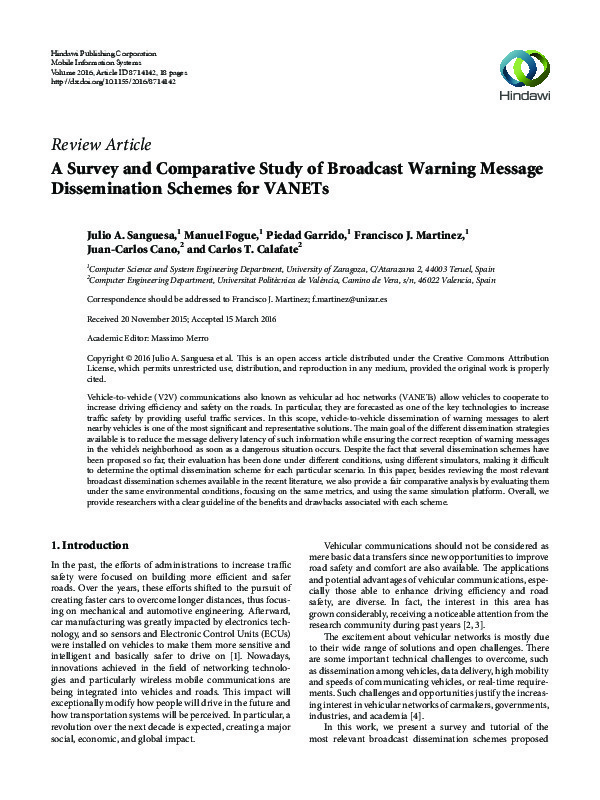JavaScript is disabled for your browser. Some features of this site may not work without it.
Buscar en RiuNet
Listar
Mi cuenta
Estadísticas
Ayuda RiuNet
Admin. UPV
A Survey and Comparative Study of Broadcast Warning Message Dissemination Schemes for VANETs
Mostrar el registro sencillo del ítem
Ficheros en el ítem
| dc.contributor.author | Sangüesa-Escorihuela, Julio Alberto
|
es_ES |
| dc.contributor.author | Fogue, Manuel
|
es_ES |
| dc.contributor.author | Garrido, Piedad
|
es_ES |
| dc.contributor.author | Martinez Dominguez, Francisco Javier
|
es_ES |
| dc.contributor.author | Cano Escribá, Juan Carlos
|
es_ES |
| dc.contributor.author | Tavares de Araujo Cesariny Calafate, Carlos Miguel
|
es_ES |
| dc.date.accessioned | 2017-03-06T10:27:11Z | |
| dc.date.available | 2017-03-06T10:27:11Z | |
| dc.date.issued | 2016 | |
| dc.identifier.issn | 1574-017X | |
| dc.identifier.uri | http://hdl.handle.net/10251/78510 | |
| dc.description | © 2016 Julio A. Sanguesa et al. This is an open access article distributed under the Creative Commons Attribution License, which permits unrestricted use, distribution, and reproduction in any medium, provided the original work is properly cited. | es_ES |
| dc.description.abstract | Vehicle-to-vehicle (V2V) communications also known as vehicular ad hoc networks (VANETs) allow vehicles to cooperate to increase driving efficiency and safety on the roads. In particular, they are forecasted as one of the key technologies to increase traffic safety by providing useful traffic services. In this scope, vehicle-to-vehicle dissemination of warning messages to alert nearby vehicles is one of the most significant and representative solutions. The main goal of the different dissemination strategies available is to reduce the message delivery latency of such information while ensuring the correct reception of warning messages in the vehicle's neighborhood as soon as a dangerous situation occurs. Despite the fact that several dissemination schemes have been proposed so far, their evaluation has been done under different conditions, using different simulators, making it difficult to determine the optimal dissemination scheme for each particular scenario. In this paper, besides reviewing the most relevant broadcast dissemination schemes available in the recent literature, we also provide a fair comparative analysis by evaluating them under the same environmental conditions, focusing on the same metrics, and using the same simulation platform. Overall, we provide researchers with a clear guideline of the benefits and drawbacks associated with each scheme. | es_ES |
| dc.description.sponsorship | This work was partially supported by the Ministerio de Economia y Competitividad, Programa Estatal de Investigacion, Desarrollo e Innovacion Orientada a los Retos de la Sociedad, Proyectos I+D+I 2014, Spain, under Grant TEC2014-52690-R, and by the Government of Aragon and the European Social Fund (T91 Research Group). | |
| dc.language | Inglés | es_ES |
| dc.publisher | Hindawi Publishing Corporation | es_ES |
| dc.relation.ispartof | Mobile Information Systems | es_ES |
| dc.rights | Reconocimiento (by) | es_ES |
| dc.subject | Ad hoc networks | es_ES |
| dc.subject | Safety messages | es_ES |
| dc.subject | Mobility models | es_ES |
| dc.subject.classification | ARQUITECTURA Y TECNOLOGIA DE COMPUTADORES | es_ES |
| dc.title | A Survey and Comparative Study of Broadcast Warning Message Dissemination Schemes for VANETs | es_ES |
| dc.type | Artículo | es_ES |
| dc.identifier.doi | 10.1155/2016/8714142 | |
| dc.relation.projectID | info:eu-repo/grantAgreement/MINECO//TEC2014-52690-R/ES/INTEGRACION DEL SMARTPHONE Y EL VEHICULO PARA CONECTAR CONDUCTORES, SENSORES Y ENTORNO A TRAVES DE UNA ARQUITECTURA DE SERVICIOS FUNCIONALES/ | es_ES |
| dc.rights.accessRights | Abierto | es_ES |
| dc.contributor.affiliation | Universitat Politècnica de València. Departamento de Informática de Sistemas y Computadores - Departament d'Informàtica de Sistemes i Computadors | es_ES |
| dc.contributor.affiliation | Universitat Politècnica de València. Escola Tècnica Superior d'Enginyeria Informàtica | es_ES |
| dc.description.bibliographicCitation | Sangüesa-Escorihuela, JA.; Fogue, M.; Garrido, P.; Martinez Dominguez, FJ.; Cano Escribá, JC.; Tavares De Araujo Cesariny Calafate, CM. (2016). A Survey and Comparative Study of Broadcast Warning Message Dissemination Schemes for VANETs. Mobile Information Systems. 2016:1-18. https://doi.org/10.1155/2016/8714142 | es_ES |
| dc.description.accrualMethod | S | es_ES |
| dc.relation.publisherversion | https://www.hindawi.com/journals/misy/2016/8714142/ | es_ES |
| dc.description.upvformatpinicio | 1 | es_ES |
| dc.description.upvformatpfin | 18 | es_ES |
| dc.type.version | info:eu-repo/semantics/publishedVersion | es_ES |
| dc.description.volume | 2016 | es_ES |
| dc.relation.senia | 305074 | es_ES |
| dc.contributor.funder | Ministerio de Economía y Competitividad | |
| dc.contributor.funder | Gobierno de Aragón | es_ES |
| dc.contributor.funder | European Social Fund |








